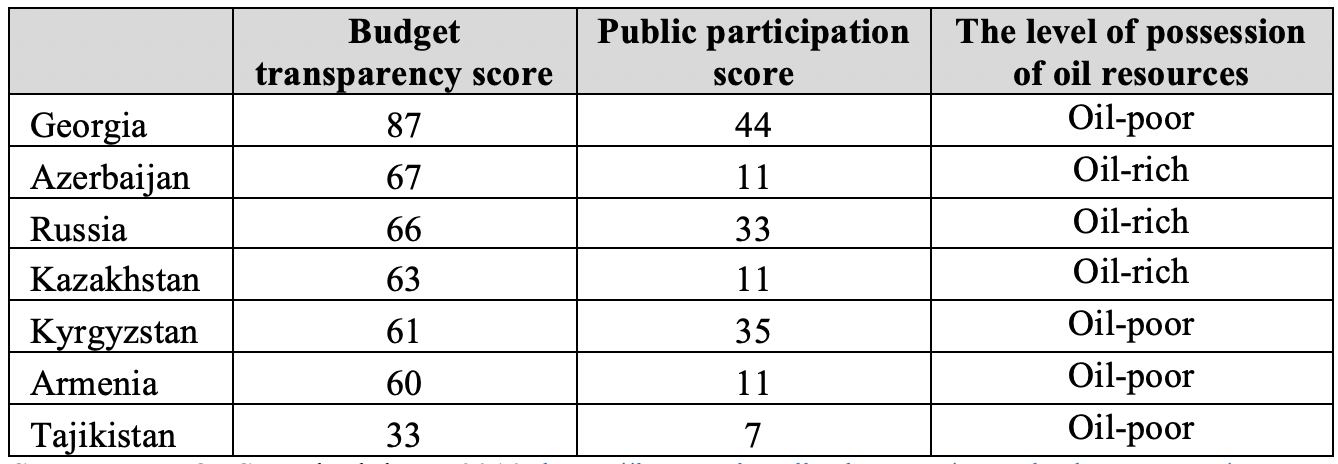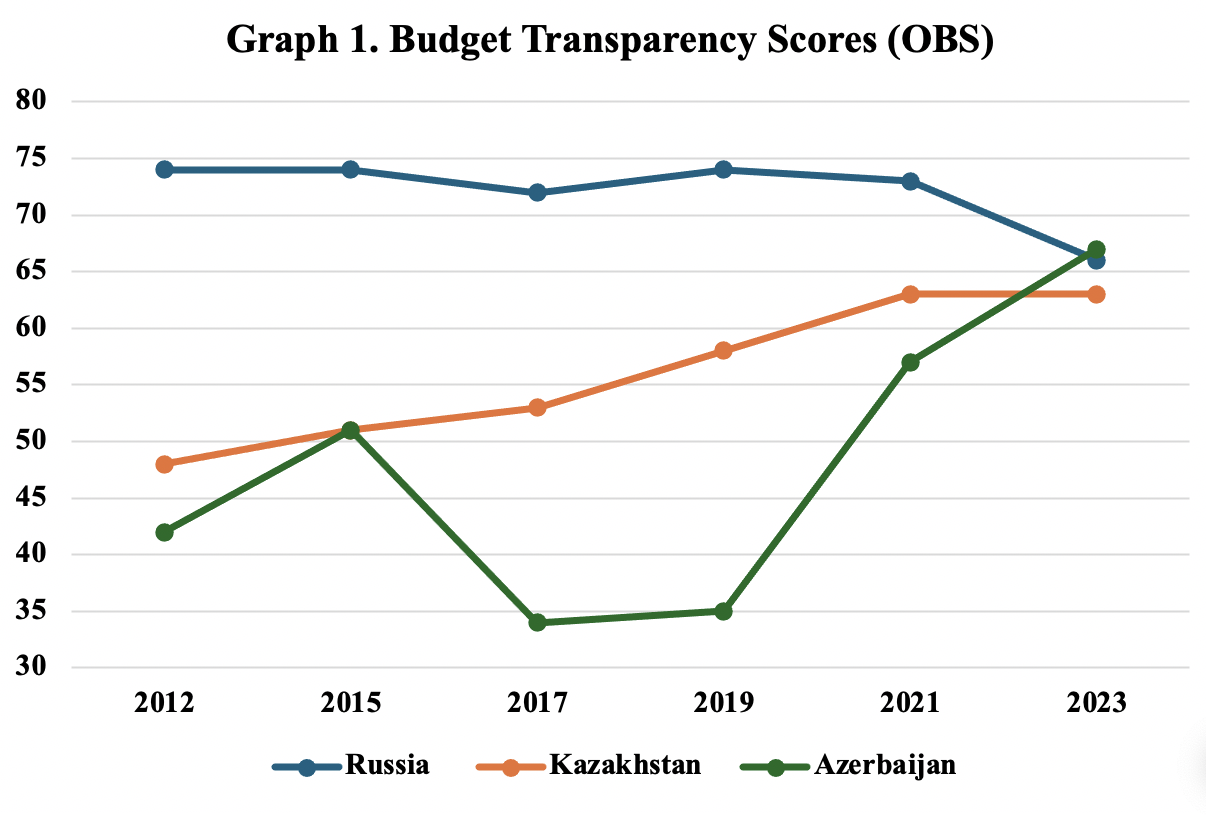
“Transparency without Participation” Phenomenon in the Resource-Rich Post-Soviet States - Dr. Kenan Aslanli

“Transparency without Participation” Phenomenon in the Resource-Rich Post-Soviet States - Dr. Kenan Aslanli
Introduction
Some post-Soviet countries, such as Azerbaijan, Kazakhstan, and Russia, have enormous fossil fuel reserves (oil, gas, and coal) and developed mining industries, including metals and minerals. In this article, fiscal transparency and natural resource management in the oil-rich post-Soviet countries will be evaluated from the civil society perspective. Natural resource revenues had varied effects on civic spaces and enabling environment for civil society organizations (CSOs), (i) deepening the asymmetries between states and non-state actors; (ii) deteriorating institutional settings for sound public policies. We will especially focus on the oil factor in the case of Azerbaijan, Kazakhstan, and Russia, because of the scale and scope of oil revenues in these countries. The share of oil rents in GDP was 21% in Azerbaijan, 15% in Kazakhstan, and 10% in Russia in 2021.i
“Transparency without Participation” (TwP) and Open Budget Survey (OBS)
The oil-rich post-Soviet states enhanced budget transparency and simultaneously shrinking public space for meaningful public participation during the last two decades. We can denominate this phenomenon as the “Transparency without Participation” (TwP) model of the post-Soviet states. This trend can be revealed or demonstrated by exploring the Open Budget Survey results for the respective post-Soviet states. The Open Budget Survey, prepared by the International Budget Partnership (IBP), is a comparative and evidence-based global research instrument that evaluates citizens’ access to governments’ available fiscal data. Additionally, the OBS assesses occasions of public participation in the entire budget cycle (planning, preparation, enactment, execution, audit) and the role of external budget oversight institutions, including parliaments and Supreme Audit Institutions (SAIs).
Table 1. “Transparency without participation” (TwP) model of the post-soviet states

Source: IBP. OBS Methodology. 2019. https://internationalbudget.org/open-budget-survey/country-results
Budget transparency and public participation performances
Table 1 demonstrates budget transparency and public participation scores of oil-rich and oil-poor countries of the post-Soviet geography in the OBS 2023 round. Countries obtain budget transparency and public participation scores from 0 (lowest) to 100 (highest).ii Almost all post-Soviet countries suffered from lacking public participation opportunities for citizens and civil society organizations in the budget process. However, two out of three oil-rich post-Soviet states (namely, Azerbaijan and Kazakhstan) that were included in the OBS 2023 performed very weakly (11 out of 100 maximum scores) in the OBS’s public participation block. Two relatively well-performed post-Soviet states in the OBS 2023 list were oil-poor Georgia and Kyrgyzstan.
Source: IBP. OBS 2023. https://internationalbudget.org/open-budget-survey/country-results
The two worst performers among oil-rich post-Soviet countries, Azerbaijan and Kazakhstan, improved their budget transparency between 2012-2023 (see Graph 1). Retrograding civil society legislation, limiting access to donor funding, and a brain drain from civil society to the government and private sector are key characteristic features of civic space in Kazakhstan, Azerbaijan, and Russia. Shrinking civic space and the scarcity of independent civil society actors that could monitor available budget data and reveal discrepancies create comfort zones for the oil-rich post-Soviet governments in terms of enhancing budget transparency. Therefore, effective public participation is a more valuable pillar of the budget accountability ecosystem, holding government agencies and even relevant private sector actors accountable for their use of public finances.
Global and regional trends
OBS 2023 outcomes indicate that the “Transparency without Participation” (TwP) model isn’t characteristic only for post-Soviet states but is a global phenomenon. OBS 2023 results show that public participation was traditionally the most fragile column of the broader budget accountability compared to two other critical backbones, such as budget transparency and budget oversight (legislative and audit). The average budget transparency score was 45, the average legislative oversight score was 45, and the average audit oversight score was 62, while the average public participation score was only 15 for 125 countries assessed in the Open Budget Survey 2023. If we focus on the regional level, the Middle East and North Africa (MENA) region performed worst regarding budget transparency scores.iii Eastern Europe and Central Asia regions, including Azerbaijan, Kazakhstan, and Russia, have slightly improved budget transparency while public participation.
Concluding remarks
Even if some countries possess public participation techniques, they usually comprise budget formulation and enactment stages rather than the actual execution of budget expenditures. However, the actual budget implementation is a crucial stage of the budget cycle when public and private actors utilize or misuse public money to deliver social and other services to the broad population and sensitive and underrepresented social groups. Therefore, local civil society organizations, donor agencies, and international budget transparency movements must concentrate their efforts on public participation in the budget implementation stage of the budget cycle. Also, the existing “Transparency without Participation” (TwP) model in oil-rich post-Soviet countries clearly demonstrates the primacy of participation over transparency in terms of achieving real outputs for the effective use of public finances resources under the framework of sustainable and inclusive development.
Dr. Kenan Aslanli
This article is part of a series written by participants of Global South Study Week 2024 and does not necessarily reflect the views of ANND.
References
“World Bank Open Data.” World Bank Open Data. https://data.worldbank.org/indicator/NY.GDP.PETR.RT.ZS?most_recent_value_desc=true.
“Country Results | International Budget Partnership.” International Budget Partnership. https://internationalbudget.org/open-budget-survey/country-results.
“Annex A. Open Budget Survey 2019 Methodology.” International Budget Partnership. 2019. https://internationalbudget.org/sites/default/files/2020-04/2019_Methodology_EN.pdf
“Open Budget Survey 2023 9th Edition.” International Budget Partnership. 2023. https://internationalbudget.org/wp-content/uploads/IBP-OBS-Global-Report-2023-v4-Final-Artwork.pdf
i World Bank. Oil Rents (% of GDP). 2021. https://data.worldbank.org/indicator/NY.GDP.PETR.RT.ZS?most_recent_value_desc=true
ii International Budget Partnership (IBP). Annex A. Open Budget Survey 2019 Methodology. https://internationalbudget.org/sites/default/files/2020-04/2019_Methodology_EN.pdf
iii International Budget Partnership (IBP). The Open Budget Survey (OBS) 2023. Survey Findings (page 11-12). https://internationalbudget.org/wp-content/uploads/IBP-OBS-Global-Report-2023-v4-Final-Artwork.pdf
Recent publications

